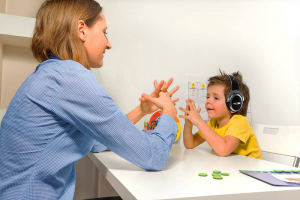Social Engagement and Anxiety: Therapy Techniques
We live in a social world. Interpersonal communication is essential to developing healthy relationships at school, home and work. In fact, our sense of safety in the world depends on healthy social engagement. When we feel safe, we can participate genuinely with others and be open and willing to accept new ideas. Without a sense of safety, our self-preservation and motivation to get through the current situation kicks in. We become closed off to others, oppositional and short sighted.

Kids who struggle to interact appropriately with classmates, teachers and other adults are uncomfortable in new situations, in crowds, or when the environment is changing and unfamiliar. When eye contact is avoided, it is often interpreted as rude, uncaring or awkward. Despite desperate efforts to belong, they are unable to connect to friends or strangers.
Adults and Social Engagement Issues
Adults with poor social engagement misinterpret the meaning in conversation and are themselves misunderstood. The back-and-forth flow of conversation may not be easy for them. This damages relationships and makes work and social events uncomfortable and unproductive.
How do Unyte programs help Social Engagement?
Safe and Sound Protocol (SSP)
Social engagement is a central target of the SSP. The Polyvagal Theory explains how the SSP improves communication through voice inflection, deep listening, and improved facial expression to promote social engagement and the feeling of safety.
HOW IT WORKS

Music, Multisensory Input & Movement

Brain & Body Organization

My Best Self



All iLs systems come with supervision, either from your current iLs-trained therapist or from an iLs-employed coach who can work remotely with clients who don’t have an iLs provider in their area. You can find an iLs Provider here or contact us to locate someone in your area.
Case Studies
Social Engagement Difficulties
“Client comes in happy to do experiment. Therapist notes that she is really enjoying doing the intervention.”
Videos
“Every therapist we’ve seen — they have all told us to be looking at residential treatment facilities… I no longer worry for him. My worries for him are much more in line with what every parent worries about for their child.”
– Kimberly McRae, Mother
-
Our son has completed the Focus System program and has been attending the after school/summer sessions. We have seen a lot of changes and progress in our son as a result of these combined programs. His nonverbal skills have improved and his verbal fluency continues to increase by leaps and bounds. He is learning to trust others which is shown by his willingness to take cues from others when he is uncertain about things. He enjoys accomplishing tasks with a partner and he also watches what other people/kids do and thereby incorporates more detail and challenges into the tasks he is doing.
-
Parent
We have tried so many other things with minimal help – we just never got to the core of the issue – the SSP got to the core.






 © 2025 Unyte Health US Inc.
© 2025 Unyte Health US Inc.